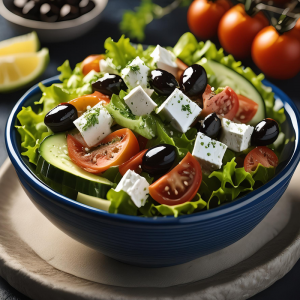Horiatiki Salad – Village Salad (Greece)
 Garanties sécurité
Garanties sécurité
(à modifier dans le module "Réassurance")
 Politique de livraison
Politique de livraison
(à modifier dans le module "Réassurance")
 Politique retours
Politique retours
(à modifier dans le module "Réassurance")
Horiatiki Salad – Village Salad (Greece)
The Horiatiki salad, also known as the "village salad," is an iconic dish of Greek cuisine. It embodies the simplicity and freshness of Mediterranean products, typical of everyday meals in Greek villages. Often consumed during the summer, this salad is made with local, fresh, and high-quality ingredients that combine perfectly to offer an explosion of flavors.
History and Origin
The Horiatiki salad originates from Greece, and its name, "Horiatiki," literally means "village salad." This dish is an integral part of traditional Greek cuisine, especially in rural regions where fresh ingredients are directly grown in local gardens. Traditionally, the salad was prepared with seasonal products that were easily found on Greek farms. This dish reflects the Mediterranean philosophy of eating simple yet high-quality products, without embellishments.
One of the reasons why the Horiatiki salad is so popular is its simplicity. The ingredients are mostly fresh, minimally processed, and used in their most natural form. Feta cheese, Kalamata olives, and Santorini capers are local products that bring authenticity and character to this salad. It is especially appreciated during summer meals, often served as a side dish to other Mediterranean dishes or as a light main course.
Ingredients
The ingredients of the Horiatiki salad are simple, but each one plays an essential role in creating the authentic and fresh taste of this dish. Here are the main ingredients used in a traditional Horiatiki salad:
- Onion – Κρεμμύδι (Kremmýdi): Red or white onion, thinly sliced, adds a pungent and crunchy note.
- Tomato – Ντομάτα (Domáta): Ripe and juicy tomatoes are a key ingredient to bring sweetness and acidity to the salad.
- Cucumber – Αγγούρι (Angoúri): Fresh and crunchy, cucumber adds freshness.
- Green Bell Pepper – Πράσινη Πιπεριά (Prásini Piperiá): It adds a slight bitterness and a crunchy texture to the salad.
- Kalamata Olives – Ελιές Καλαμάτας (Eliés Kalamátas): These black olives from Greece are known for their rich and slightly salty taste.
- Oregano – Ρίγανη (Rígani): A classic Mediterranean herb that provides an essential aromatic touch.
- Feta AOP – Φέτα (Féta): Feta is a typical Greek cheese made from sheep's milk, with a firm texture and a slightly salty taste. It is often cut into large cubes or left in a block on the salad.
- Wild Santorini Capers – Άγριες Κάπρες από τη Σαντορίνη (Ágries Kápres apó ti Santoríni): These capers, from the island of Santorini in the Cyclades, add a unique and spicy flavor.
- Kyklopas Olive Oil – Ελαιόλαδο Κυκλώπας (Elaiólado Kyklópas): The best olive oil from Greece. All the olive trees are of the Makri variety, a local variety from the olive oil-producing region of northern Greece. Kyklopas extra virgin olive oils are among the most awarded in Greece. They are known for their richness and purity.
- Critida Balsamic Vinegar – Βαλσαμικό ξύδι Κρητικό (Valsamikó xýdi Kritikó): Produced in Crete, this fruity vinegar adds a unique taste and character to anything it touches. It’s perfect for seasoning salads and raw vegetables. Ideal for making vinaigrettes and sauces.
Preparation
- Cut the vegetables: Cut the tomatoes into large chunks, the cucumber into slices, the green bell pepper into strips, and the onion into thin slices.
- Add olives and capers: Add whole or pitted Kalamata olives and Santorini capers.
- Prepare the feta: Cut the feta into large cubes or serve it in a block on the salad.
- Season: Drizzle the salad with Kyklopas olive oil, add Critida balsamic vinegar, and then sprinkle with dried oregano.
- Mix: Gently mix all the ingredients to combine the flavors without crushing the feta.
- Serve: The salad can be served immediately, preferably accompanied by fresh bread to complement this delicious and refreshing dish.
History of Ingredients
Each ingredient in the Horiatiki salad has a rich history and is deeply rooted in Greek culture.
- Feta AOP: Feta cheese, primarily produced in Greece, is a symbol of Greek gastronomy. It holds a protected designation of origin (PDO), ensuring that it is made using traditional methods from sheep or goat milk. The Lytras family, for example, uses artisanal methods to produce feta in the Thessaly region.
- Kalamata Olives: These olives come from the Kalamata region in the southern Peloponnese. They are famous for their unique, mild, and slightly salty taste and are often used in salads and Mediterranean dishes.
- Santorini Capers: The island of Santorini is known for its wild capers, which grow on the volcanic rocks of the island. These capers have an intense, unique, and slightly spicy flavor, ideal for adding depth to dishes.
- Kyklopas Olive Oil: Produced in northern Greece from the Makri olive variety, this extra virgin olive oil is among the most prized in the country. It has a fruity and slightly tangy flavor, perfect for salads and other Mediterranean dishes.
- Critida Balsamic Vinegar: Produced in Crete, this high-quality vinegar is appreciated for its complex, fruity, and slightly sweet flavors, perfect for enhancing salads.
Drinks to Pair
The light and refreshing Horiatiki salad pairs well with many Greek and Mediterranean beverages:
- Wines:
- Dry White Wine: A dry white wine, such as an Assyrtiko from Santorini or a Sauvignon Blanc, will perfectly complement the fresh and tangy flavors of the salad.
- Rosé Wine: A light, fruity rosé is also a good choice, bringing freshness and lightness.
- Beers:
- Greek Beer: A light Greek beer, such as Fix, pairs well with the character of the salad.
- Non-Alcoholic Drinks:
- Sparkling Water: Sparkling water is ideal for balancing the acidity of the salad and offering a refreshing experience.
- Fresh Lemon Juice: Fresh lemon juice, lightly sweetened or mixed with sparkling water, is an excellent accompaniment.
Dessert
After a Horiatiki salad, a light and refreshing dessert would be the perfect choice:
- Baklava: This sweet, flaky dessert made with nuts and honey is a Greek classic.
- Greek Yogurt with Honey and Walnuts: Creamy yogurt served with sweet honey and crunchy walnuts provides a simple and delicious end to the meal.
Conclusion
The Horiatiki salad, with its fresh and local ingredients, is a simple yet delicious dish that perfectly represents Mediterranean cuisine. This dish highlights the natural flavors of Greece and its islands, making it ideal for a light lunch, a summer meal, or a starter at festive meals.
Kali orexi! (Bon appétit in Greek!)


